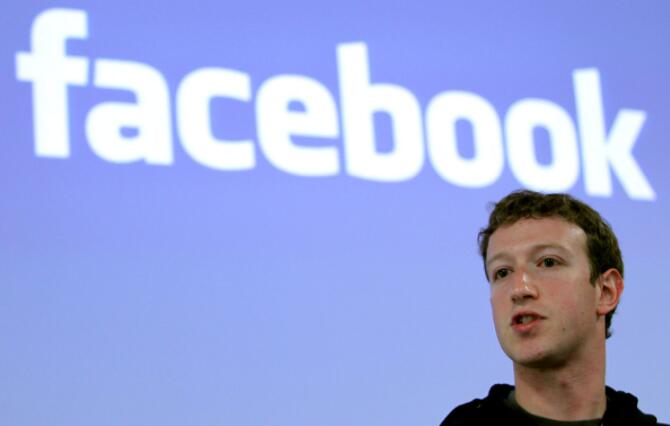Reflections on past, present and future of Facebook
- By Eugene Clark
 0 Comment(s)
0 Comment(s) Print
Print E-mail China.org.cn, April 23, 2018
E-mail China.org.cn, April 23, 2018
From its humble beginnings in the dorm of an undergrad student at Harvard University, Facebook now reaches over one billion people around the globe and has made Mark Zuckerberg one of the wealthiest individuals on the planet.

Presently, however, Facebook's stocks are looking a little shaky, as evidenced by CEO Mark Zuckerberg's recent testimony before the U.S. Congress. This testimony provided a closer look into how the company works and the issues it confronts in a world that is increasingly concerned about potential misuse of the application and resulting harms. After listening to Zuckerberg's testimony and perusing the research literature on Facebook, I would like to share the following reflections:
1. Behind the veil. My first notable observation about Zuckerberg's testimony was the level of questioning exhibited by many members of Congress. It's clear that many of them don't have even the most basic understanding of the platform, of how Facebook makes its money or of what happens in regard to a user's data. This demonstrates that technology today is so advanced that the average person cannot understand it. Yet these same legislators have the task of finding the best regulatory path to promote the advantages of new technology while at the same time limiting the potential harms.
2. Consumer protection. When asked questions about consumer protection, Zuckerberg repeatedly argued that consumers can control their own data on Facebook. But how genuine and informed is this consent? The reality is that the terms and conditions of most apps are so convoluted and voluminous (often approaching 100,000 words in length, e.g., Kindle's 70,000+) that even well-educated consumers seldom read, let alone understand, them.
3. A third reflection relates to privacy. Facebook's business model succeeds by giving us more and more of what we appear to like based upon our past online choices. In doing so, Facebook knows more about us than anyone. While Facebook claims to not share data with anyone, it is clear that others have taken their data and used if for questionable purposes, as was the case with Cambridge Analytica.
4. Bias is another concern raised both by the research literature and some of the members of Congress. It is clear that conservative groups and sites are much more likely to be struck down than their left-wing counterparts. Again, Zuckerberg admitted that Silicon Valley has a strong left-wing bias that he's trying to eliminate at Facebook.
5. The effects of Facebook. The focus on Facebook also raises questions about the positive versus the negative effects of this technology -- a tool which may be used for good and/or ill. On the positive side, Facebook connects people -- family, friends, workmates and others. It is also used by businesses and other organizations to create and communicate with a community.
One negative effect of Facebook can be isolation. While some introverted people may be encouraged to develop their confidence and relationship skills, others will stay glued to their computer and communicate even less with people in person, thus leading to further isolation. There is also the issue of distraction with numerous studies pointing to a shortened attention span and less efficient outcomes at work because people are constantly multi-tasking and suffering from continuous interruption.
6. There are concerns as well about the impact of Facebook on democracy. Numerous commentators have criticized the "fake news" that appeared on Facebook and the use of Facebook to discourage voter turnout and spread false stories. Perhaps demonstrating its political bias, it is also interesting that the Obama's campaign of 2012 was widely praised for its use of Facebook and bringing political campaigning into the digital age.
7. How do you regulate a global giant? Yet another issue arising from Facebook is the reality that it is now a global company. How do national governments, with limited jurisdiction, pass effective laws that work to regulate a global company?
8. Role of politics. Like Bill Gates discovered when the courts challenged Microsoft's anti-competitive practices in relation to Netscape, as tech companies grow and have major influences on society, politics will begin to enter the picture. Facebook is also being challenged on competition law and policy grounds as arguably having become too large. Once a company grows to the size of Facebook, does it amount to a monopoly? How should governments act to break up a monopoly and promote genuine competition?
9. There is also the larger question of the failure of law to keep up with technology. Most law makers often do not understand it, and regulatory theory also lags behind developing workable regulatory solutions that would ensure that society reaps the benefits and encourages innovation while at the same time enshrining the wisdom that would protect against the harms and misuses of that technology.
Eugene Clark is a columnist with China.org.cn. For more information please visit:
http://www.china.org.cn/opinion/eugeneclark.htm
Opinion articles reflect the views of their authors only, not necessarily those of China.org.cn.






Go to Forum >>0 Comment(s)